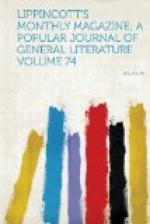J.A.M.
The Etymology of “Babe.”
In the latest English etymological dictionary, that by the Rev. W.W. Skeat, we read under the word babe, “Instead of babe being formed from the infantine sound ba, it has been modified from maqui, probably by infantine influences. Baby is a diminutive form.”
Maqui is Early Welsh for son, and those to whom Mr. Skeat’s modified maqui seems absurd will be pleased to find its absurdity indicated, if not proved, by a Greek author of the sixth century.
The following passage in the seventy-sixth section of Damascius’s “Life of Isidorus” has escaped the notice of English etymologists generally:
“Hermias had a son (the elder of his philosopher sons) by AEdesia, and one day, when the child was seven months old, AEdesia was playing with him, as mothers do, calling him babion and paidion, speaking in diminutives. But Hermias overheard her, and was vexed, and censured these childish diminutives, pronouncing an articulate reprimand.... Now the Syrians, and especially those who dwell in Damascus, call newborn children, and even those that have passed the period of childhood, babia, from the goddess Babia, whom they worship.”
What is babion but the English baby, what babia but the English babies? We can hardly suppose that our English words are derived from Syriac words in use fourteen centuries ago, or that the latter were “modified from maqui” by “infantine” or other influences. We are therefore driven to the conclusion that they were alike “formed from the infantine sound ba,” unless we accept Damascius’s derivation from Babia.
Unfortunately, we know no more concerning this goddess than did the learned John Selden, who, writing two hundred and twenty-odd years ago, “De Dis Syris,” says, on page 296 of that work, “I cannot conjecture whether Babia, who seems to have been reverenced among the Syrians as goddess of childhood and youth, is identical with the Syrian Venus or not, and I do not remember to have met with any mention of this deity except in Damascius’s Life of Isidorus.”
Selden’s memory was not at fault: the words babion, babia, and Babia occur only in the passage above quoted.
In the absence of other evidence than Damascius’s own, we may well question whether he has not inverted the etymological relation between the goddess and the babies. Most divinities owe their names to the attributes or functions imputed to them by their worshippers. It seems, therefore, more probable that the Syrian protectress of babies owes her name to the babia than that they were called babia in her honor. If, however, we accept Damascius’s theory of their relation, what forbids us to conjecture that the goddess’s name was itself “formed from the infantine sound ba”? In any case, the little domestic scene between the priggish father and the dandling mother is amusing and instructive to parents as well as to etymologists.




